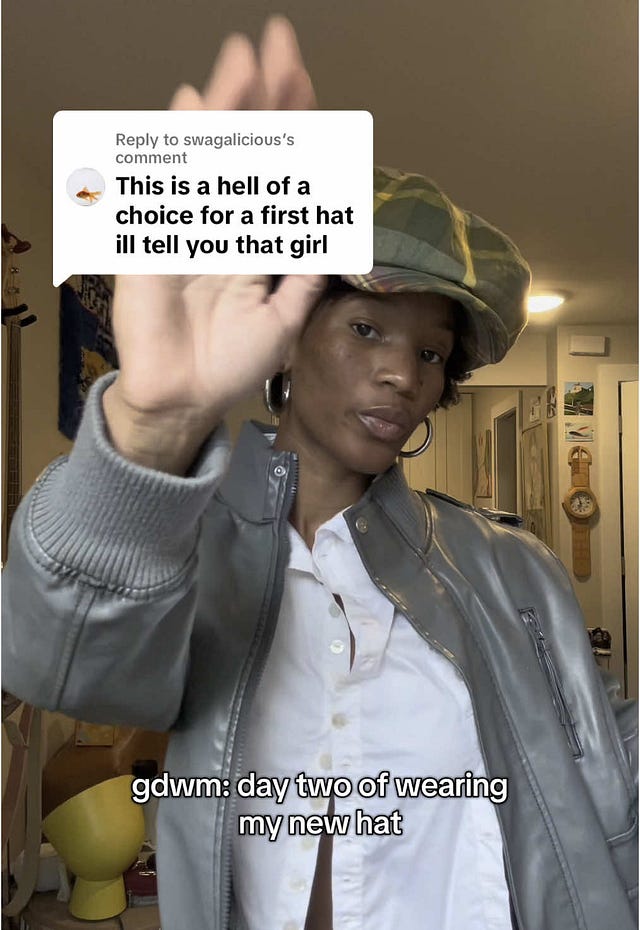Is the ‘internet culture reporter’ job dead?
Mainstream outlets are pulling back from a necessary beat.
Embedded is your essential guide to what’s good on the internet, written by Kate Lindsay and edited by Nick Catucci.
In my unbiased opinion... —Kate
Remember the “sad beige” influencer lawsuit? Dismissive headlines ended up obscuring a truly wild story. Plus, the ethics of that “influencer royal wedding” your FYP can’t stop talking about:
A few weeks ago, an internet culture journalist who wishes to remain anonymous was speaking on a panel with a technology reporter she had not met before. They introduced themselves.
“When I said that I cover internet culture, he very quickly said he ‘doesn’t pay attention to all that,’” the journalist recalls. “It wasn’t the first time I’ve had someone adjacent to my beat purposely differentiate themselves from what I do.”
I have also noticed this vibe shift. For the first half of my career, it was a battle to convince editors that internet culture stories or creators were worth covering. Then came the internet culture reporting boom of 2020.
In the years since, traditional tech coverage and internet culture coverage have worked hand in hand. They need each other, in my opinion, because you can’t responsibly report on one without the context provided by the other. But in 2023, BuzzFeed News shut down, and with it their internet culture vertical. Since then, outlets like Business Insider, NBC News, and TechCrunch, all of which claimed some of the most needed internet culture reporting, laid off many of the journalists responsible for it.
Now these former staff reporters are navigating the job market in an industry keen to distance itself from their beat. “You will mostly focus on front-of-book-style pieces and short features that examine the tech industry and the lifestyle and culture of the technorati (A fundamentally different task than covering ‘internet culture’),” reads the description of the open Weekend Reporter role at The Information.
When Elon Musk and Mark Zuckerberg stood behind Donald Trump at his inauguration, tech coverage officially became politics coverage, too—and politics is Serious. Coverage of these figures in mainstream outlets has ramped up to an all-time high while “internet culture” reporting has fallen back.
“This is an evolution of the industry’s treatment of anything that can be gendered female,” says Kat Tenbarge, a former internet culture reporter at NBC News who now helms her own newsletter, Spitfire News. “Lifestyle content and entertainment and anything that is associated with women, where women tend to be the reporters and editors, has been siloed, and treated as different and less significant.”
Maybe I’m reading too much into the scare quotes in The Information’s job listing, but they’d be less scary if the role was being differentiated from one that still actually existed. Anyone looking for a full-time internet culture reporter job right now is almost entirely out of luck. These are the only open roles I could find that a person with that experience would theoretically qualify for:
Editor at Hard Fork, the New York Times’ weekly tech podcast
BuzzFeed.com AI creative fellow
AI Columnist, Weekend at The Information
Senior Tech Reporter, NBC News Digital
Nearly all of the roles specify somewhat narrow coverage—that of the tech elite, or the tech elite’s current favorite venture: AI.
“It’s not wrong that we would have more reporters covering AI,” says
, who previously covered internet culture and extremism for Business Insider. “What feels particularly frightening to me is if you read these job postings, they want people with contacts within the company who are gonna have scoops about the actual moves of the players in the industry. It's a very particular, specific type of reporting, and in my opinion, that's not necessarily the type of beat that's gonna be holding the industry to account.”Meanwhile, there’s no shortage of editors looking to assign trend write-ups and online drama explainers to freelancers. “It’s no coincidence that there are so few internet culture reporter jobs now, but there is this reliance on freelancing,” Tenbarge says. “It's just a way to continue to minimize this field. Even if they want it, they don't want to give the position the dignity of being a full-time role. They wanna reserve those roles for what they view to be more important reporting, things like reporting on Elon Musk, reporting on Mark Zuckerberg, reporting on the companies themselves, versus the culture.”
As a result, and aside from the current full-time internet culture reporters who are still valiantly soldiering through, internet culture has become almost entirely an independent beat. In addition to worker-owned outlets like 404 Media, laid off or defected internet culture reporters have set up shop on platforms like Beehiiv and Substack for broader internet cultural reporting and commentary. There’s Platformer by Casey Newton, Garbage Day by Ryan Broderick,
by , Read Max by , Yap Year by , by , and Spitfire News by Tenbarge, to name a few.“Independent media people are breaking all the major online culture news while the mainstream media has some underpaid staffer write up the news two months late as an explainer for 55 year olds,” says Lorenz, who was a tech writer for The Washington Post.
This isn’t news to recent graduates. Merrilees, the writer behind one of the newer internet culture Substacks,
, never had any faith she’d find her dream job at a publication. She says that in terms of professional opportunities, “for new grads, you kind of learn it's all bad, which I know is a terrible thing, but people sort of take what they can get.” She herself has landed on a mix of freelancing and content creation.In a way, it makes sense that internet culture reporters would be among those leading a new era of independent journalism—their beat, after all, is about independent content creators. They have spent their careers studying the very model they now follow, and have enough literacy in things like brand deals and other forms of sponsorships to incorporate them into their ventures.
Another reason we might not be seeing as many internet culture reporter roles is, ironically, because internet culture has gone mainstream. “The term ‘internet culture reporter’ came about at a time where that meant something different than culture reporter,” Greenspan says. “The internet is culture now. It’s dissipated into other things.”
But while the internet may now factor into almost every beat, someone with an understanding of its history, mechanisms, trends, and fringes is still necessary for accurate reporting. “The reporters who were the most ahead of Trumpism and the way conspiratorial thinking was bleeding into mainstream American political culture were largely reporters who were covering the internet and its communities,” Greenspan says. “Not the people covering the tech moguls.”
The issue is not that publications are reporting on the tech elite pulling strings in our government, but that fewer and fewer reporters are assigned to covering the people living with the consequences of those power moves—for instance, the U.S. State Department’s expansion of “social media vetting” for student visa applicants and Meta’s censorship of content about Palestine. “This is why mainstream media is so deeply unqualified and unprepared to cover this moment,” Lorenz says, “and why these legacy outlets will slide further into irrelevance.”
Independent voices continue to diligently break news on this beat: Casey Newton drove the entire 2022 news cycle about widespread user backlash to proposed changes to Instagram. Earlier this year, Lorenz revealed that Meta had banned the largest Muslim news page on Instagram in India. Most recently,
published the private group chat in which the accused killer of two Israeli Embassy staffers shared views that contradict President Trump’s assertion that he had an antisemetic motive. But mainstream outlets could easily boost this necessary reporting by steering resources to the journalists who are most qualified to do it.Welcome to the weekly scroll, a roundup of articles, links, and other thoughts from being on the internet this week! Ahead: AI delusions, dark energy, and what the next phase of social media might look like.
What I’m consuming…
I can only watch any Nathan Fielder content through my fingers as clips on TikTok, but this interview from a DECADE ago gives a really thoughtful glimpse into what’s happening in his brain behind all the behavior that makes me too uncomfortable to watch it.
Why Does Everything Sound Like an Audition Song for 'The Voice'?
This creator’s whole TikTok series about wearing a hat:
Keep reading with a 7-day free trial
Subscribe to Embedded to keep reading this post and get 7 days of free access to the full post archives.







